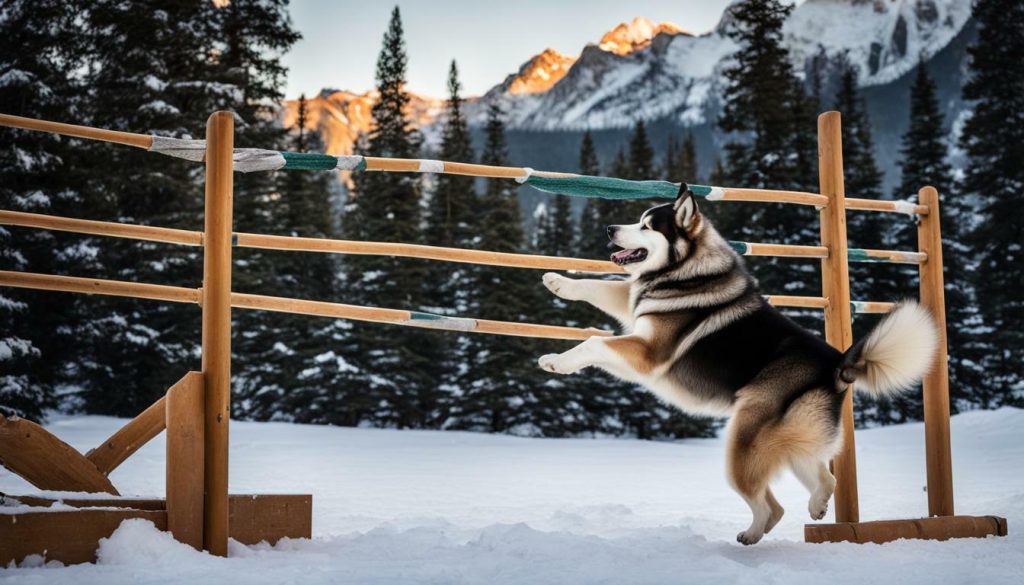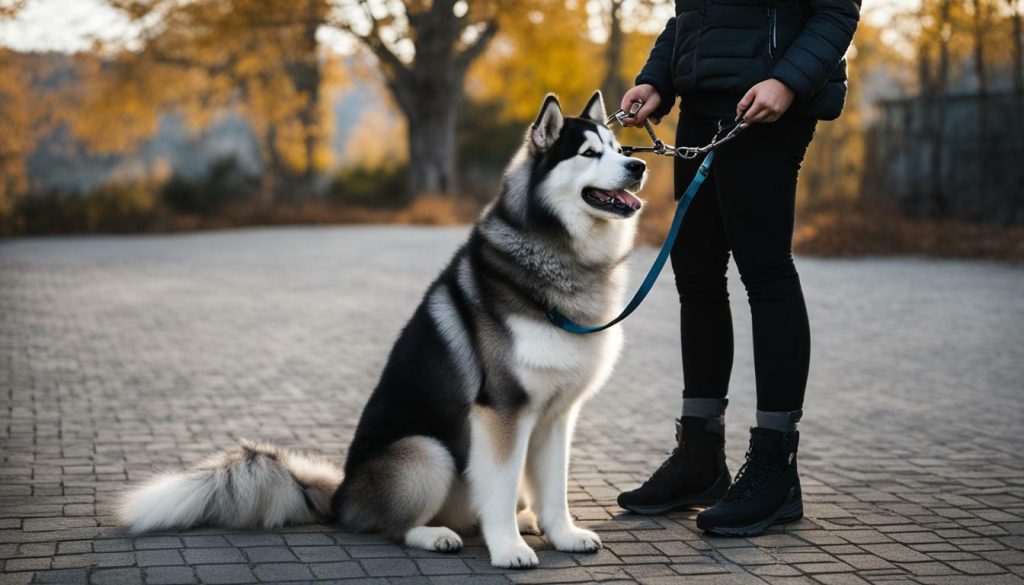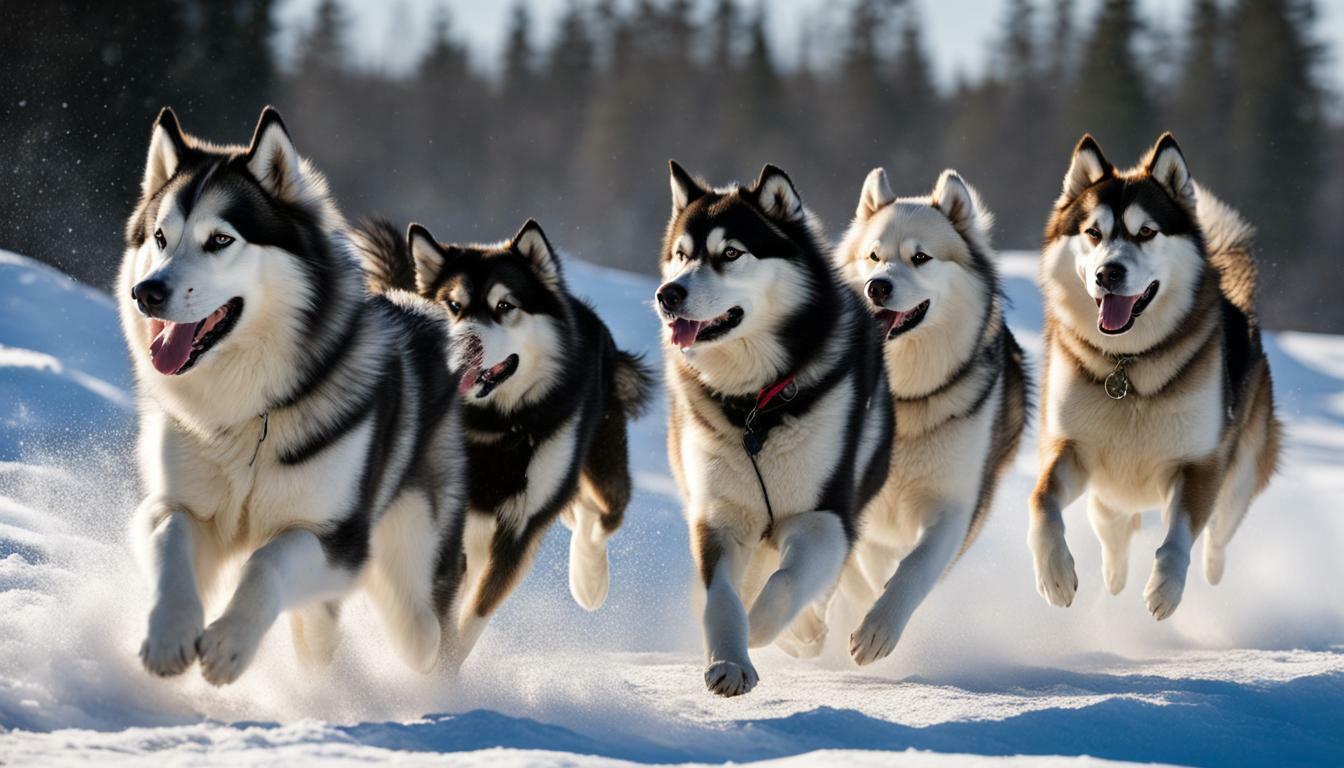Alaskan Malamutes are known for their stubbornness, which can sometimes present challenges to their owners. Understanding their behavior, temperament, and personality is crucial for effectively managing their stubborn tendencies.
Alaskan Malamutes have a genetic predisposition towards stubbornness, making it difficult for them to excel in learning tricks and commands. Despite their intelligence, their lack of motivation can hinder their training progress.
Patience and consistency are key when it comes to training an Alaskan Malamute. It requires a dedicated effort to establish yourself as the alpha and consistently enforce rules and boundaries.
Early socialization is essential for Alaskan Malamutes to become comfortable around different surroundings and other dogs. It helps them develop confidence and well-rounded behavior.
Alaskan Malamutes also have high exercise requirements. Providing them with at least 2 hours of physical activity per day helps prevent behavioral issues and keeps them physically and mentally stimulated.
While their stubborn nature can present challenges, Alaskan Malamutes are incredibly loyal and affectionate pets. Understanding their needs and being prepared to work with their unique personalities can result in a rewarding relationship.
In the following sections, we will delve deeper into the genetic and motivational factors behind Alaskan Malamutes’ stubbornness, training challenges, effective techniques, and the importance of early socialization. We will also provide insights into establishing yourself as the alpha, understanding their needs, and tips for effective training.
The Genetic and Motivational Factors Behind Alaskan Malamute’s Stubbornness
The stubbornness of Alaskan Malamutes can be attributed to a combination of genetic factors and a lack of motivation, making them more resistant to learning and training compared to other breeds. These majestic dogs have a strong sense of independence that stems from their heritage as working sled dogs in harsh Arctic conditions.
Their genetic makeup plays a significant role in their stubborn behavior. Alaskan Malamutes have a long history of living and working in packs, relying on their instincts and decision-making abilities. This independent streak can make them less inclined to obey commands and conform to traditional training methods.
Additionally, the lack of motivation can hinder their learning abilities. While Alaskan Malamutes are highly intelligent dogs, they are not as inherently eager to please their owners as some other breeds. This can make them less responsive to training and less likely to work for rewards or praise.
| Genetic Factors | Motivational Factors |
|---|---|
| Independent nature from their history as working sled dogs | Lack of eagerness to please their owners |
| Strong decision-making abilities | Resistance to traditional training methods |
Despite their stubbornness, Alaskan Malamutes are incredibly intelligent and possess a strong will. They require a patient and understanding approach to training that emphasizes positive reinforcement and consistency. It’s essential to find what motivates your Malamute, whether it’s treats, praise, or playtime, and use those incentives to encourage their cooperation.
Key Takeaways:
Understanding the genetic and motivational factors behind Alaskan Malamute’s stubbornness is crucial for effective training and management. Their independent nature, coupled with a lack of motivation, can make them resistant to traditional training methods. However, with patience, positive reinforcement, and consistent training techniques, their stubbornness can be overcome, leading to a harmonious and fulfilling relationship with your Alaskan Malamute.

Training a stubborn Alaskan Malamute can present unique challenges, but with the right techniques and approach, it is possible to achieve obedience and cooperation. These intelligent and independent dogs require a patient and consistent training regimen that takes into account their stubborn nature.
An essential aspect of training a Malamute is to establish yourself as the alpha, as they have a strong pack mentality. By displaying calm assertiveness and consistent leadership, you can gain their respect and cooperation. Avoid using harsh punishment or forceful methods, as this can lead to resentment and resistance.
Positive reinforcement is key when working with a stubborn Malamute. Utilize rewards such as treats, praise, and playtime to motivate and reinforce desired behaviors. Break training sessions into short, frequent intervals to maintain their focus and prevent boredom.
Early socialization is crucial for Alaskan Malamutes to ensure they are comfortable and well-behaved in different environments and around other dogs. Expose them to various situations, people, and animals from a young age, gradually increasing the level of difficulty. This will help them develop confidence and reduce potential anxiety or aggression.
Table: Training Tips for Stubborn Alaskan Malamutes
| Tip | Description |
|---|---|
| Be Patient | Stubbornness is a natural trait of Alaskan Malamutes. Stay calm, be patient, and avoid getting frustrated. |
| Stay Consistent | Establish clear rules and boundaries, and enforce them consistently. Avoid mixed signals or changing expectations. |
| Use Positive Reinforcement | Reward good behavior with treats, praise, and playtime. This will motivate your Malamute to repeat desirable actions. |
| Keep Training Sessions Short | Malamutes have short attention spans. Keep training sessions brief and engaging to maintain their focus. |
| Practice Regular Exercise | Provide your Malamute with at least 2 hours of exercise daily to help release energy and reduce behavioral issues. |
Remember, each Alaskan Malamute is unique, and it may take time to find the most effective techniques for your individual dog. Stay consistent, be patient, and celebrate small victories along the way. With dedication and understanding, you can build a strong bond and achieve a well-trained, obedient Malamute.

Early socialization plays a vital role in shaping the behavior and temperament of Alaskan Malamutes, helping them develop into well-rounded and adaptable dogs. By exposing them to various environments, people, and dogs during their early months, you can help your Malamute become comfortable and confident in different situations.
Malamutes are naturally friendly and sociable, but without proper socialization, they may become fearful or aggressive toward unfamiliar people or animals. Introducing them to different sights, sounds, and experiences from an early age can prevent behavioral issues and ensure they grow up to be happy and well-behaved companions.
During socialization, it’s important to create positive associations by rewarding your Malamute for calm and friendly behavior. This will help them form positive associations with new experiences and reinforce good manners. Patience and consistency are key when socializing your Alaskan Malamute, as it can take time for them to adjust to new situations and build confidence.
| Benefits of Early Socialization |
|---|
| 1. Reduced fear and aggression towards new people and animals |
| 2. Improved adaptability to different environments and situations |
| 3. Better social skills with other dogs and pets |
| 4. Increased confidence and reduced anxiety |
Remember, early socialization is a lifelong investment in your Alaskan Malamute’s well-being. The time and effort you put into socializing them will pay off in the form of a well-behaved, confident, and happy companion.
The Rewarding Loyalty and Affection of Alaskan Malamutes
Despite their stubborn nature, Alaskan Malamutes are known for their unwavering loyalty and affection towards their owners. Once you establish a bond with your Malamute, you can expect a lifetime of devotion and companionship.
Malamutes thrive on human interaction and enjoy being a part of the family. They love spending time with their owners, whether it’s going on walks, playing games, or simply snuggling up on the couch. Their affectionate nature makes them wonderful companions for individuals and families alike.
It’s important to remember that Malamutes are pack animals with a strong pack mentality. They see their human family members as part of their pack, and establishing yourself as the alpha is crucial for a harmonious relationship. By providing consistent leadership, clear boundaries, and positive reinforcement, you can build a strong bond based on trust and respect.

In conclusion, while Alaskan Malamutes may have a stubborn streak, understanding their behavior and meeting their needs can help you navigate their unique temperament successfully. With early socialization, proper training, and consistent leadership, you can unlock the full potential of your Alaskan Malamute and enjoy the rewarding experience of having a loyal and affectionate companion by your side.
Exercise Requirements for Alaskan Malamutes
Alaskan Malamutes have high exercise requirements, and regular physical activity is essential for their mental and physical well-being. These energetic dogs thrive when they have outlets to release their pent-up energy. Exercise not only helps them maintain a healthy weight but also prevents behavior problems that may arise from boredom or frustration.
It is recommended to provide Alaskan Malamutes with at least 2 hours of exercise per day. This can include a combination of brisk walks, jogging, hiking, or engaging in activities like agility training or playing fetch. These activities not only help stimulate their minds but also allow them to burn off excess energy.
When planning your Malamute’s exercise routine, it’s important to consider their individual needs and abilities. Keep in mind that these dogs have a thick double coat that can make them more susceptible to heat exhaustion, so avoid exercising them in extreme weather conditions. If you live in a warmer climate, it’s best to exercise them during the cooler parts of the day, such as early morning or late evening.

Regular exercise provides numerous benefits for Alaskan Malamutes, both physically and mentally. It helps them maintain a healthy weight, improve cardiovascular health, and strengthen their muscles and joints. A well-exercised Malamute is less likely to engage in destructive behaviors, such as chewing or digging, as they can channel their energy into positive activities.
| Benefits of Exercise for Alaskan Malamutes |
|---|
| Weight management |
| Cardiovascular health |
| Muscle and joint strength |
| Reduced behavior problems |
Regular exercise is essential for Alaskan Malamutes to lead happy and healthy lives. It not only helps them physically but also mentally. So, make sure to incorporate plenty of exercise into their daily routine to keep them stimulated and content.
Establishing Yourself as the Alpha with Alaskan Malamutes
Alaskan Malamutes have a pack mentality, making it crucial for owners to establish themselves as the alpha to maintain a harmonious relationship and manage their stubborn tendencies. These intelligent and independent dogs need a strong leader who can provide guidance and set clear boundaries. By establishing yourself as the alpha, you can earn your Malamute’s respect and trust, which will ultimately lead to a well-behaved and obedient companion.
One effective way to establish yourself as the alpha is through consistent and assertive leadership. Malamutes respond best to confident and firm commands that leave no room for negotiation. Be clear in your expectations and use positive reinforcement techniques such as rewards and praise when your dog follows your commands. Consistency is key; ensure that everyone in the household is on the same page and enforces the same rules and boundaries. This will prevent confusion and help your Malamute understand their place in the hierarchy.
Building a Balanced Relationship
“A balanced relationship with your Alaskan Malamute is built on trust, respect, and mutual understanding.”
In addition to assertive leadership, it is important to build a balanced relationship with your Alaskan Malamute. This means providing them with plenty of physical and mental stimulation, as well as affection and positive reinforcement. Malamutes thrive on engaging activities such as obedience training, agility courses, and interactive games that challenge their minds. By meeting their needs for exercise and mental stimulation, you can help prevent boredom, which can lead to destructive behaviors.
Understanding Your Malamute’s Needs
Understanding your Malamute’s needs and temperament is crucial in establishing yourself as the alpha. These dogs are known for their stubbornness and independent nature, so it’s important to be patient and consistent in your training methods. Avoid using harsh or negative reinforcement techniques, as they can result in fear or aggression. Instead, focus on positive reinforcement, using treats, praise, and play as rewards for desired behaviors. This will create a positive association with training and make it more enjoyable for both you and your Malamute.

Remember, building a strong bond with your Alaskan Malamute is a journey that requires time and effort. Be patient, consistent, and understanding to unlock the full potential of your furry companion. With the right approach, you can effectively manage their stubborn tendencies and enjoy a loving and loyal relationship with your Alaskan Malamute.
Understanding the Needs of Stubborn Alaskan Malamutes
To manage a stubborn Alaskan Malamute, it is essential to understand their unique needs, behavior patterns, and the underlying reasons for their stubbornness. These beautiful, intelligent dogs have a strong sense of independence, which can sometimes translate into resistance when it comes to training and obedience. Their stubborn nature is a combination of genetic predispositions and a lack of motivation in conventional learning methods. However, with the right approach, patience, and consistency, their stubbornness can be effectively managed.
One key aspect of addressing the needs of stubborn Alaskan Malamutes is early socialization. Exposing them to different environments, people, and dogs from an early age helps them develop the confidence to handle new situations. This socialization process can minimize their inclination to be stubborn and allow them to interact more positively with their surroundings.
| Key Points | Benefits |
|---|---|
| Early socialization | – Promotes comfort and confidence – Minimizes stubbornness – Positive interactions with surroundings |
“Early socialization is crucial for Alaskan Malamutes to develop the confidence to handle various environments, people, and dogs. It helps minimize their inclination to be stubborn and allows for more positive interactions with their surroundings.” – Alaskan Malamute expert
In addition to socialization, regular exercise is vital for Alaskan Malamutes. These energetic dogs require at least 2 hours of physical activity each day to channel their energy in a positive way. Exercise not only keeps them physically fit but also helps prevent behavioral issues that may arise from pent-up energy. By providing them with sufficient exercise, you can reduce their stubbornness and make training sessions more effective.
Understanding the pack mentality of Alaskan Malamutes is another crucial aspect of managing their stubbornness. These dogs have a natural inclination to establish a hierarchy within the family, so it is essential for owners to establish themselves as the alpha. By assuming the role of a calm and confident leader, you can gain their respect and cooperation. This can be achieved through consistent training, rewards for good behavior, and setting clear boundaries.

- Understanding the unique needs and behavior patterns of Alaskan Malamutes is crucial in managing their stubbornness.
- Early socialization helps them develop confidence and minimize their inclination to be stubborn.
- Regular exercise of at least 2 hours per day channels their energy in a positive way, reducing stubbornness.
- Establishing yourself as the alpha through consistent training and clear boundaries is important to address their pack mentality.
With patience, dedication, and a deep understanding of their needs, Alaskan Malamutes can thrive as loyal and affectionate companions.
Patience and Consistency: Keys to Handling a Stubborn Alaskan Malamute
Patience and consistency are vital when dealing with a stubborn Alaskan Malamute, allowing for gradual progress and the development of a strong bond between owner and pet. These intelligent and independent dogs require a firm and patient approach to training in order to overcome their stubborn nature.
One effective technique is positive reinforcement, rewarding your Malamute for good behavior with treats, praise, or play. Consistency in commands and expectations is also key, as mixed signals can confuse your dog and hinder their progress. Training sessions should be short and frequent, focusing on one command or behavior at a time.
It’s important to understand that Alaskan Malamutes thrive on routine and structure. Establishing yourself as the leader of the pack is crucial for them to respect and follow your commands. This can be achieved by setting clear boundaries, enforcing rules consistently, and providing them with plenty of mental and physical stimulation.
Remember that patience is key when dealing with a stubborn Alaskan Malamute. It may take time for them to understand and respond to training, but with persistence and a positive attitude, you can unlock their potential and enjoy a harmonious relationship with your furry companion.

| Training Tips for Dealing with a Stubborn Alaskan Malamute |
|---|
| “Consistency is key; be clear and firm with commands.” |
| “Use positive reinforcement to reward good behavior.” |
| “Keep training sessions short and frequent.” |
| “Establish yourself as the pack leader through boundaries and rules.” |
| “Be patient and persistent; progress will come with time.” |
The Rewarding Loyalty and Affection of Alaskan Malamutes
Beyond their stubbornness, Alaskan Malamutes possess a deep loyalty and affection that can make them incredibly rewarding companions for those who are patient and understanding. While their strong-willed nature can present training challenges, their loyalty to their owners is unwavering. Alaskan Malamutes are known for forming strong bonds with their families, and their devotion knows no bounds.
One of the most endearing qualities of Alaskan Malamutes is their affectionate demeanor. They thrive on human companionship and crave physical contact. Whether it’s cuddling on the couch or giving gentle kisses, these dogs know how to melt your heart. Their expressive eyes and loving nature are hard to resist, making them ideal pets for those seeking a devoted and affectionate companion.

In addition to their loyalty and affection, Alaskan Malamutes are known for their playful and fun-loving personalities. They have a natural zest for life and are always up for an adventure. Whether it’s a hike in the mountains or a game of fetch in the backyard, these dogs thrive on activity and enjoy spending quality time with their families.
With their striking appearance, intelligence, and loving nature, Alaskan Malamutes have a lot to offer as pets. However, it’s important to remember that their stubbornness requires patience and a consistent approach to training. By understanding and meeting their needs, you can unlock their true potential and enjoy a truly rewarding relationship with these magnificent dogs.
Conclusion: Nurturing the Potential of Your Alaskan Malamute
By understanding the behavior and temperament of Alaskan Malamutes and employing effective training techniques, you can unlock their potential and create a deep bond that goes beyond their stubborn tendencies. While it is true that Malamutes can be challenging to train due to their independent nature, with patience and consistency, you can overcome these obstacles and build a strong, fulfilling relationship with your furry companion.
Early socialization plays a crucial role in shaping the behavior of Alaskan Malamutes. By exposing them to various environments, people, and dogs at a young age, you can help them develop confidence and adaptability. This will ensure that they are comfortable in different situations, reducing the likelihood of stubborn behavior.
Additionally, it is essential to meet the exercise requirements of Alaskan Malamutes. These active and energetic dogs need at least 2 hours of daily exercise to channel their energy in a positive way and prevent behavioral issues. Regular exercise not only keeps them physically fit but also helps them maintain mental stimulation, reducing their inclination towards stubbornness.
Establishing yourself as the alpha is another key aspect of handling a stubborn Alaskan Malamute. Malamutes have a pack mentality, and they respond well to strong, consistent leadership. By setting clear boundaries, using positive reinforcement techniques, and maintaining a balanced relationship, you can gain their respect and cooperation.

Unlock Your Alaskan Malamute’s Potential: Tips for Effective Training
Discover effective tips for training a stubborn Alaskan Malamute and unlock their full potential as a well-behaved and loyal companion. Alaskan Malamutes are known for their stubborn nature, which can make training a bit challenging. However, with the right approach, patience, and consistency, you can overcome their stubbornness and establish a strong bond with your furry friend.
First and foremost, understand that Alaskan Malamutes have a strong pack mentality. To be successful in training, you need to establish yourself as the alpha. This means setting clear boundaries and consistently enforcing them. By being a confident and authoritative leader, you will earn their respect and cooperation.
Along with being assertive, positive reinforcement is key when training a stubborn Alaskan Malamute. Reward their good behavior with treats, praise, and affection. This will motivate them to repeat those behaviors and make the training process more enjoyable for both of you.
Consistency is crucial in training a Malamute. Set a regular training schedule and stick to it. Keep the sessions short, around 10-15 minutes, to maintain their focus and prevent boredom. Repeat commands consistently and use the same gestures or cues each time. This will help them understand what is expected of them and reinforce their training.
Lastly, remember that exercise is essential for Alaskan Malamutes. They are an active and energetic breed that requires plenty of physical and mental stimulation. Make sure to provide them with at least 2 hours of exercise daily, such as long walks, runs, or engaging in dog sports. A tired Malamute is more likely to be receptive to training and less prone to stubborn behaviors.
In conclusion, training a stubborn Alaskan Malamute may pose some challenges, but with patience, consistency, and a positive approach, you can overcome their stubborn nature and unleash their full potential. By establishing yourself as the alpha, using positive reinforcement, maintaining consistency, and providing them with ample exercise, you will not only have a well-behaved companion but also a loyal and loving friend for life.
FAQ
Q: Are Alaskan Malamutes known for being stubborn?
A: Yes, Alaskan Malamutes are known for their stubborn nature.
Q: Why are Alaskan Malamutes stubborn?
A: Their stubbornness is a result of their genetics and a lack of motivation.
Q: Do Alaskan Malamutes excel in learning tricks and commands?
A: No, due to their stubborn nature, they do not excel in learning tricks and commands.
Q: How should I train a stubborn Alaskan Malamute?
A: Training a Malamute requires patience, consistency, and positive reinforcement techniques.
Q: Why is early socialization important for Alaskan Malamutes?
A: Early socialization is essential for them to be comfortable around different surroundings and other dogs.
Q: How much exercise do Alaskan Malamutes need?
A: Alaskan Malamutes require at least 2 hours of exercise per day to meet their energy needs.
Q: How can I establish myself as the alpha with my Alaskan Malamute?
A: Establishing yourself as the alpha requires consistent leadership and assertive yet gentle guidance.
Q: What should I understand as an owner of a stubborn Alaskan Malamute?
A: Owners should understand their needs and be prepared for their stubbornness, requiring patience and consistency in training.
Q: Are Alaskan Malamutes loyal and affectionate?
A: Yes, despite their stubbornness, Alaskan Malamutes can be incredibly loyal and affectionate pets.
